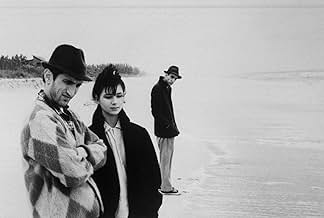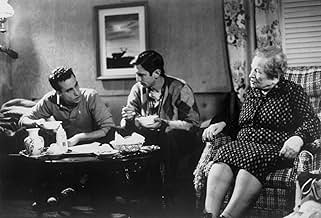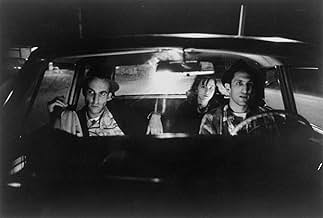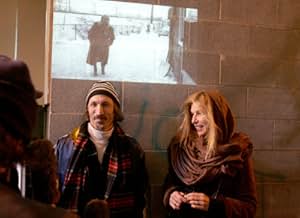IMDb-BEWERTUNG
7,4/10
42.159
IHRE BEWERTUNG
Das Leben eines New Yorkers gerät ins Wanken, als ihn seine jüngere Cousine überraschend besucht und ein seltsames, unvorhersehbares Abenteuer beginnt.Das Leben eines New Yorkers gerät ins Wanken, als ihn seine jüngere Cousine überraschend besucht und ein seltsames, unvorhersehbares Abenteuer beginnt.Das Leben eines New Yorkers gerät ins Wanken, als ihn seine jüngere Cousine überraschend besucht und ein seltsames, unvorhersehbares Abenteuer beginnt.
- Auszeichnungen
- 8 Gewinne & 2 Nominierungen insgesamt
Empfohlene Bewertungen
An excellent example of why independent films are so invaluable, `Stranger Than Paradise,' written and directed by Jim Jarmusch, is a bare-bones production that never would have found the light of day in the mainstream. Essentially a character study, the story is a glimpse into the lives of three people: Willie (John Lurie); his cousin, Eva (Eszter Balint), recently arrived in New York from Hungary; and Willie's friend, Eddie (Richard Edson). After a couple of weeks in the Big Apple with Willie, Eva moves to Cleveland to live with their Aunt; a year later, Willie and Eddie are off to visit her. One thing leads to another, and the trio wind up in Florida (the designated paradise of the title). Watching this film is like spending time with some people you know; the characters are real people, so much so that watching them becomes almost voyeuristic, the camera somehow intrusive, exposing as it does the private lives of these individuals. It succinctly captures their lack of ambition, the ambiguity with which they approach life, and the fact that they seemingly have no prospects for the future beyond whatever a lucky day at the track affords them. The action, such as it is, is no more than what you would find in the average day of someone's life. The dialogue is what drives the film, though frankly, nothing they have to say is very interesting. And yet, this is an absolutely engrossing film; sometimes amusing, at times hilarious, but mesmerizing throughout. The performances are entirely credible, and again, you never have the sense that these are actors, but rather real people who happen to have had some moments from their lives filmed and presented to the audience for perusal. Jarmusch has an innate sense of capturing the essence of the everyday and transforming the most simplistic and mundane events into refreshingly documented, worthwhile viewing. It's an inspired piece of film making, helped to some extent by the stark black&white photography that adds to the realism of the overall proceedings. The use of brief blackouts during transitions works effectively, as well as providing the film with a unique signature. Original music is by Lurie, but the highlight is the use of the song `I Put A Spell On You,' by Screamin' Jay Hawkins, used recurringly throughout the movie, and which exemplifies that special touch Jarmusch brings to his projects. And there's a superb bit of irony at the end that really makes this gem sparkle. The supporting cast includes Cecillia Stark (Aunt Lotte), Danny Rosen (Billy), Tom DiCillo (Airline Agent), Richard Boes (Factory Worker) and Rockets Redglare, Harvey Perr and Brian J. Burchill (as the Poker players). `Stranger Than Paradise' may not be to everyone's liking, but to those seeking an alternative to the typical Hollywood big-budget fare available, it just may fit the bill and provide a satisfying, entertaining experience. I rate this one 8/10.
Reading over the comments so far, it seems that most people think this film is great, with a rare few criticizing it for being a boring 'student-film'.
People, this is for sure not a film for those who've been brutalized by too much Hollywood cinema - it's a quiet movie that you absorb slowly. It's very well done and quite absorbing. Sure it makes me think of so-called student-films (my brother is in film school), but that's not to say it's not a damn good one. There's something to be said for beautiful photography (the black and white images go so well with the feelings of emptiness and coldness) and the search for a meaning in life. These people are desperately in need of meaning and affection, none of which they seem to be able to find - or give. This is a movie about that desperate search.
And it's well worth seeing - for those with a bit of patience and artistic sensibility. It's a movie about emptiness for sure, but is by no means 'boring'. I'd give it 4/5 stars.
People, this is for sure not a film for those who've been brutalized by too much Hollywood cinema - it's a quiet movie that you absorb slowly. It's very well done and quite absorbing. Sure it makes me think of so-called student-films (my brother is in film school), but that's not to say it's not a damn good one. There's something to be said for beautiful photography (the black and white images go so well with the feelings of emptiness and coldness) and the search for a meaning in life. These people are desperately in need of meaning and affection, none of which they seem to be able to find - or give. This is a movie about that desperate search.
And it's well worth seeing - for those with a bit of patience and artistic sensibility. It's a movie about emptiness for sure, but is by no means 'boring'. I'd give it 4/5 stars.
Life is strikingly uneventful for Willie, played by renaissance man John Lurie, who refers to himself as a hipster and lives in New York City, and his interactions with his Hungarian cousin Eva, played by avant-garde actress-musician Eszter Balint, and his best friend Eddie, played by yet another actor-musician Richard Edson, who dresses exactly like Willie. Indeed, both males are swarthy with hook noses and fedoras. They have such little interest in or knowledge of anything that their eventual vacation is no different from home.
The quirky way to three-act story format is a succession of single-shot scenes punctuated by black leader, and the clear-cut partition of the story into three straightforward, facetiously named episodes. Yet there are other ceremonial characteristics of substance: Tom DiCillo's black-and-white camera work, which provides Jarmusch's acute impression for the American panorama; and the arresting appliance of music, which favorably apposes Screamin' Jay Hawkins's I Put a Spell on You with the folksy tinges of John Lurie's score for string quartet. This is definitely a road movie, but one with a distinction: Different from most instances of the then still immensely fashionable genre, Stranger Than Paradise appeared simultaneously comprehensively American and strangely European.
The oddly enlightening aggregate of involvement and reserve may be found in the film's lovingly absurd view of Willie's chic affectations, its quaint posture toward some of the inanities of American culture and in the way it harmonizes a decidedly American genre and decidedly American plot---if a narrative as gravely sparse and as concentrated on dead moments may be dubbed a plot---with all form of un-Hollywood expression. The look, rhythm, cast and mainly dismal feel bring to mind not The Blues Brothers, or even the rather subdued Last Detail, but the beginnings of the degree of minimalism to which Jarmusch would take his later work.
However he also loves various attributes of popular culture. See how Willie and Eva watch Forbidden Planet on TV or go with Eddie and Eva's discouraged fancier to see a bone-crunching Hong Kong martial-arts flick at a Cleveland grindhouse, and lets them neighbor more virtuous aspects of his films, in such a way that there is no discrepancy between high and low. And it's for that scarce but wholly judicious mindset that Jarmusch is to be particularly noted. It's doable to distinguish his connection with a gamut of later American indie directors, specifically in his desert drollery, his passionately entertained captivation with slackers of sundry kinds, his concern with sequential framework, his affinity for severely subdued stories, and his clever, antiquated references to popular culture. All these, at a time scarce in American cinema, are now pretty ubiquitous. But the rhyme, the unabashed regard for cinema as a quality, production, expression, a realm, according to aesthetic principles, of what is beautiful, appealing, or of more than ordinary significance, even the mundanities of life and the most everyday scenery possible, that can confront crucial, important matters is far more difficult to come across.
Considering, in the end, no matter how amusing, stylized, minute or insignificant his films may strike one at first, they are always about something. For all his cinephilia, they're inspired not, like Tarantino and Rodriguez, by other movies, but by life: by real people, encountering real feelings. And while this black-and-white deadpan pop culture satire may be a comedy, an dissection of cinematic storytelling, and a thoroughly cynical yarn, it's also a film about America and the people who live there. It's about those people's connections to each other, and their connections to the rooms they populate, the city streets, the suburbs, diners and highways. And it's made by someone who knows there may be reality in abstraction, who finds a visceral alliteration separating a snow-coated Lake Erie and a barren Florida beach, and who fashions an implausibly true character like Aunt Lotte, always jabbering to her tender company in Hungarian, whether they're listening or not.
The quirky way to three-act story format is a succession of single-shot scenes punctuated by black leader, and the clear-cut partition of the story into three straightforward, facetiously named episodes. Yet there are other ceremonial characteristics of substance: Tom DiCillo's black-and-white camera work, which provides Jarmusch's acute impression for the American panorama; and the arresting appliance of music, which favorably apposes Screamin' Jay Hawkins's I Put a Spell on You with the folksy tinges of John Lurie's score for string quartet. This is definitely a road movie, but one with a distinction: Different from most instances of the then still immensely fashionable genre, Stranger Than Paradise appeared simultaneously comprehensively American and strangely European.
The oddly enlightening aggregate of involvement and reserve may be found in the film's lovingly absurd view of Willie's chic affectations, its quaint posture toward some of the inanities of American culture and in the way it harmonizes a decidedly American genre and decidedly American plot---if a narrative as gravely sparse and as concentrated on dead moments may be dubbed a plot---with all form of un-Hollywood expression. The look, rhythm, cast and mainly dismal feel bring to mind not The Blues Brothers, or even the rather subdued Last Detail, but the beginnings of the degree of minimalism to which Jarmusch would take his later work.
However he also loves various attributes of popular culture. See how Willie and Eva watch Forbidden Planet on TV or go with Eddie and Eva's discouraged fancier to see a bone-crunching Hong Kong martial-arts flick at a Cleveland grindhouse, and lets them neighbor more virtuous aspects of his films, in such a way that there is no discrepancy between high and low. And it's for that scarce but wholly judicious mindset that Jarmusch is to be particularly noted. It's doable to distinguish his connection with a gamut of later American indie directors, specifically in his desert drollery, his passionately entertained captivation with slackers of sundry kinds, his concern with sequential framework, his affinity for severely subdued stories, and his clever, antiquated references to popular culture. All these, at a time scarce in American cinema, are now pretty ubiquitous. But the rhyme, the unabashed regard for cinema as a quality, production, expression, a realm, according to aesthetic principles, of what is beautiful, appealing, or of more than ordinary significance, even the mundanities of life and the most everyday scenery possible, that can confront crucial, important matters is far more difficult to come across.
Considering, in the end, no matter how amusing, stylized, minute or insignificant his films may strike one at first, they are always about something. For all his cinephilia, they're inspired not, like Tarantino and Rodriguez, by other movies, but by life: by real people, encountering real feelings. And while this black-and-white deadpan pop culture satire may be a comedy, an dissection of cinematic storytelling, and a thoroughly cynical yarn, it's also a film about America and the people who live there. It's about those people's connections to each other, and their connections to the rooms they populate, the city streets, the suburbs, diners and highways. And it's made by someone who knows there may be reality in abstraction, who finds a visceral alliteration separating a snow-coated Lake Erie and a barren Florida beach, and who fashions an implausibly true character like Aunt Lotte, always jabbering to her tender company in Hungarian, whether they're listening or not.
Jarmusch was never much of a guy to dip in the mainstream; "Ghost Dog: Way of the Samurai" is about as Hollywood as you're going to get from him. His recent "Coffee and Cigarettes" might have alluded to his roots as an indie filmmaker, but its stories are monochromatic and offer little emotional variety save for the Albert Molina vignette. His best film might be this one, a miniature masterpiece that is underrated when compared to his other stuff. The basic premise of the film revolves around a New York immigrant from Eastern Europe, his goofy buddy, and his female cousin who comes to visit him and America as they jump from state to state.
There isn't much of a plot for sure, but Jarmusch more than compensates for this fact by creating three distinct characters that manage to be sweet without resorting to cheap sentiment. These guys might be rude and frivolous at times, but they never lose their sense of embarrassed compassion, nor as a direct result their humanity as complete characters as well. There's a morose wit to all of these proceedings. All three actors truly seem to have a playful camaraderie, working the motions of a natural friendship with Jarmusch's direction that shows them at their happiest only to be disappointed again and again, like a kid getting clothes instead of video games at Christmas once more. This honest and easygoing subtext doesn't include undemanding Hollywood moments of syrupy tenderness or mawkish emotion. For once, the clichéd adage of characters writing themselves is probably true here, as the film has an almost improvised quality to it. Jarmusch gets the careful balance between static ugliness and a subtext of natural warmth just right.
While the great heart of this film lies in its characterization, it's catapulted into greatness because of Jarmusch's quiet touch. In nearly every one of his films the director is obsessed with the awkward silences that make up nearly every relationship. He's much more revealing with the silences here, fleshing out character development in a car ride or while staring out at the blankness of snowy Cleveland. This brings me to my final point that Jarmusch again does with intelligence. When the characters move from city to city, they have a passionate belief that what they will find is something unbelievable. But the New York we see is a bunch of back alleys and graffiti. Cleveland is a blank white expanse, strangely vapid as opposed to pictorial. And Florida has to be the ugliest Florida ever depicted on screen, consisting mainly of a "Welcome to Florida" sign and a decrepit motel. While the main message is that life is often full of disappointments, that life is rarely full of transcendent moments, people can still connect with each other regardless of their surrounding environments. It's Jarmusch's best statement yet, and it's for these reasons this one must be seen even before even his fine "Mystery Train." The film, essentially a three-character comedy, is also thankfully kept brief, becoming genuinely meaningful and moving as a result.
There isn't much of a plot for sure, but Jarmusch more than compensates for this fact by creating three distinct characters that manage to be sweet without resorting to cheap sentiment. These guys might be rude and frivolous at times, but they never lose their sense of embarrassed compassion, nor as a direct result their humanity as complete characters as well. There's a morose wit to all of these proceedings. All three actors truly seem to have a playful camaraderie, working the motions of a natural friendship with Jarmusch's direction that shows them at their happiest only to be disappointed again and again, like a kid getting clothes instead of video games at Christmas once more. This honest and easygoing subtext doesn't include undemanding Hollywood moments of syrupy tenderness or mawkish emotion. For once, the clichéd adage of characters writing themselves is probably true here, as the film has an almost improvised quality to it. Jarmusch gets the careful balance between static ugliness and a subtext of natural warmth just right.
While the great heart of this film lies in its characterization, it's catapulted into greatness because of Jarmusch's quiet touch. In nearly every one of his films the director is obsessed with the awkward silences that make up nearly every relationship. He's much more revealing with the silences here, fleshing out character development in a car ride or while staring out at the blankness of snowy Cleveland. This brings me to my final point that Jarmusch again does with intelligence. When the characters move from city to city, they have a passionate belief that what they will find is something unbelievable. But the New York we see is a bunch of back alleys and graffiti. Cleveland is a blank white expanse, strangely vapid as opposed to pictorial. And Florida has to be the ugliest Florida ever depicted on screen, consisting mainly of a "Welcome to Florida" sign and a decrepit motel. While the main message is that life is often full of disappointments, that life is rarely full of transcendent moments, people can still connect with each other regardless of their surrounding environments. It's Jarmusch's best statement yet, and it's for these reasons this one must be seen even before even his fine "Mystery Train." The film, essentially a three-character comedy, is also thankfully kept brief, becoming genuinely meaningful and moving as a result.
"Stranger than Paradise" (1984): Jim Jarmusch's first film. Often listed as a "comedy" and yes, I suppose there ARE a few oddly funny moments for the most part I find it an intensely bleak film, empty of almost all life but for a few lone cruiser characters who are detached from everyone else. The photography is astoundingly beautiful black & white. They are almost shot as individual stills with minor movements in them, and divided by blatant black divisions, which one can think of as the black pages of an old photo album. The velvety rich blacks, grays, and whites, plus the composed "still" scenes, cause me to think Jarmusch was trained as a static, 2-D artist first. Just a guess. This film is NOT about acting, which is limited at best, but doesn't really need much. We observe an alienated set of scenarios which are only enhanced by the stiff, awkward exchanges and pauses of the characters, and the lack of movement in the camera work. Ambient sound adds to the gritty reality of emptiness. Funny or not, this is a low-key, lost-souls story of detachment and aimlessness.
Wusstest du schon
- WissenswertesDirector Jim Jarmusch was dismayed to discover all the money he paid for the rights to Screamin' Jay Hawkins' "I Put a Spell on You" went to the record company, with nothing going to Hawkins himself. When the film earned a profit, Jarmusch took it upon himself to track down Hawkins (who was living in a trailer park, at the time) and give him some money. It was the beginning of a friendship that lasted until Hawkins' death. According to Jarmusch, Hawkins continuously swore he'd pay him back, despite Jarmusch's insistence that the money was a gift.
- PatzerWhen Eddie and Willie are driving to Cleveland, the camera and camera operator can be seen in the reflection of the rear view mirror.
- VerbindungenEdited from Stranger than Paradise (1983)
- SoundtracksI Put a Spell on You
Written by Screamin' Jay Hawkins (as Jay Hawkins)
Used by permission of CBS Unart Catalog, Inc.
All Rights Reserved.
Performed by Screamin' Jay Hawkins
Courtesy of CBS Records
Top-Auswahl
Melde dich zum Bewerten an und greife auf die Watchlist für personalisierte Empfehlungen zu.
- How long is Stranger Than Paradise?Powered by Alexa
Details
- Erscheinungsdatum
- Herkunftsländer
- Sprachen
- Auch bekannt als
- Stranger Than Paradise
- Drehorte
- 464 Newark St, Hoboken, New Jersey, USA(Corner building when Eva first arrives and walks to apartment)
- Produktionsfirmen
- Weitere beteiligte Unternehmen bei IMDbPro anzeigen
Box Office
- Budget
- 90.000 $ (geschätzt)
- Bruttoertrag in den USA und Kanada
- 2.436.000 $
- Weltweiter Bruttoertrag
- 2.454.363 $
- Laufzeit1 Stunde 29 Minuten
- Farbe
- Seitenverhältnis
- 1.85 : 1
Zu dieser Seite beitragen
Bearbeitung vorschlagen oder fehlenden Inhalt hinzufügen

Oberste Lücke
By what name was Stranger than Paradise (1984) officially released in India in English?
Antwort




























